Royal Bank of Canada
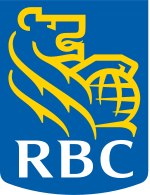 | |
| Public | |
| Traded as |
TSX: RY NYSE: RY SIX: RY |
| Industry | Financial services |
| Founded |
Halifax, Nova Scotia 1864[1] |
| Headquarters |
Toronto, Ontario, Canada[2][3] Montreal, Quebec, Canada |
Key people | David I. McKay (President & CEO) |
| Revenue | C$35.321 billion (2015) |
|
| |
| Total assets | C$1,074.208 billion (2015) |
Number of employees | 72,839 (FTE, 2015) |
| Subsidiaries | City National Bank |
| Website |
rbc |
The Royal Bank of Canada (RBC; French: Banque Royale du Canada) is a Canadian multinational financial services company and the largest bank in Canada. The bank serves over 16 million clients and has 78,000 employees worldwide.[4] The company corporate headquarters are located in Toronto, Ontario.[4][3] The bank was founded in 1864 in Halifax, Nova Scotia. RBC's Institution Number (or bank number) is 003.
In Canada, the bank's personal and commercial banking operations are branded as RBC Royal Bank in English and RBC Banque Royale in French and serves approximately ten million clients through its network of 1,209 branches. RBC Bank was the U.S. banking subsidiary with 439 branches across six states in the Southeast, which served more than a million customers.[5] RBC also has 127 branches across seventeen countries in the Caribbean, which serve more than 1.6 million clients.[6] RBC Capital Markets is RBC's worldwide investment and corporate banking subsidiary, while the investment brokerage firm is known as RBC Dominion Securities. Investment banking services are also provided through RBC Bank and the focus is on middle market clients.
RBC is listed as the largest Canadian company by revenue and market capitalization by The Globe and Mail[7] and was ranked at 50 in the 2013 Forbes Global 2000 listing.[8] The company has operations in Canada, and 40 other countries[9] and has 673.2 USD Bn of assets under management according to the Scorpio Partnership Global Private Banking Benchmark 2014, this represented an increase of 5.6% on the 2013 figure.[10]
Timeline


.jpg)

In 1864 the Merchants Bank of Halifax was founded in Halifax, Nova Scotia as a commercial bank that financed the fishing and timber industries and the European and Caribbean import/export businesses.[11] By 1869 the Merchants' Bank was officially incorporated and received its federal charter in the same year.[12] During the 1870s and 1880s the bank expanded into the other Maritime Provinces. When both the Newfoundland Commercial Bank and Union Bank of Newfoundland collapsed on 10 December 1894, the Merchants Bank expanded to Newfoundland in 31 January 1895.[12] As the bank grew executives changed its name to reflect its growth and western expansion.[11] In 1901, the Merchants’ Bank of Halifax became the Royal Bank of Canada.In 1901 the Merchants Bank changed its name to the Royal Bank of Canada (RBC). The center of the Canadian financial industry had moved from Halifax to Montreal, so the Merchants Bank relocated its head office there. In 1910 RBC merged with the Union Bank of Halifax. In the same year it built a bank branch in Winnipeg, Manitoba—designed by Carrère and Hastings, in beaux-arts classicism proclaiming the financial dominance of Winnipeg in the prairies.[13] To improve its position in Ontario, RBC merged with Traders Bank of Canada in 1912 and in 1917 RBC merged with Quebec Bank, which was founded in 1818 and chartered in 1822 in Quebec City. RBC's presence in in Manitoba and Saskatchewan was strengthened when through a 1918 merger with Northern Crown Bank, which was the result of the merger in 1908 between Northern Bank (established in 1905 in Winnipeg) and Crown Bank of Canada (1904), based in Ontario. RBC presence in the Prairie Provinces was strengthened again with the 1925 merger with the Union Bank of Canada-which had begun in Quebec City in 1865 as the Union Bank of Lower Canada, but changed its name in 1886. Union Bank of Canada had moved its headquarters to Winnipeg in 1912, and had built a strong presence in the Prairies. In 1935 RBC merged with Crown Savings and Loan Co. merges with Industrial Mortgage & Trust Co.[14] RBC installed its first computer in 1961—the first in Canadian banking. The RBC added new products throughout the 1960s and 1970s. It was at this time that RBC Insurance was created.[11] In 1968 it merged with Ontario Loan and Debenture Company (formerly Ontario Savings and Investment Society).[15] In 1993 RBC merged with Royal Trust. In 1998 The federal minister of finance (see Controversies below). In 1998 RBC acquired Security First Network Bank in Atlanta—the first pure Internet bank.[16] In 2000 RBC merged merchant credit/debit card acquiring business with BMO Bank of Montreal's to form Moneris Solutions. In 2013 RBC completed the acquisition of the Canadian subsidiary of Ally Bank owned by ResMor Trust.
RBC Insurance
RBC Insurance is the largest Canadian bank-owned insurance organization with services to over five million people. It provides life, health, travel, home and auto and reinsurance products as well as creditor and business insurance services.[11]
RBC travel insurance offers plans with lower premiums through a widely used by not well-known—an "excess" or "supplemental" insurance with a 'first payer' clause so the RBC carrier can legally seek cost-sharing from the member's group coverage as first payer, up to a certain percentage, through the subrogation process.[17]
"Any of our policies are excess insurance and are the last payers. All other sources of recovery, indemnity payments or insurance coverage must be exhausted before any payments will be made under any of our policies."— Saltzman CBC 2016
This means that if a client makes a claim, RBC will recover that amount from the member's private group health insurance provider—for example $100,000 of the $200,000 total. This can become problematic if the member later has a serious illness because many private group health insurance providers have a lifetime maximum coverage amount-$500,000 for example-for its extended health plans. If the member purchases travel insurance from their own extended health-care provider, a claim would not have affected their lifetime maximum.[17]
International timeline
RBC Royal Bank has carved out a name for itself as a leader in the Caribbean region, especially in the anglophone Caribbean.
- 1882 - Merchants Bank of Halifax opened an office in Bermuda.
- 1899 - RBC opened an agency in New York City and a branch in Havana.
- 1903 - RBC bought Banco de Oriente de Santiago de Cuba. By the mid-1920s, RBC had 65 branches in Cuba and is the largest bank in the country.
- 1904 - RBC bought Banco del Commercio de Havana.
- 1907 - RBC opened a branch in San Juan, Puerto Rico; branches in Mayagüez and Ponce followed.
- 1909 - RBC established a branch in Nassau, Bahamas.
- 1910 - RBC opened a branch in London and acquired branches in Puerto Rico and Port of Spain, Trinidad as a result of its acquisition of Union Bank of Halifax.
- 1911 - RBC opened an agency in New York City, and branches in Bridgetown, Barbados, and Kingston, Jamaica.
- 1912 - RBC bought Bank of British Honduras (incorporated in 1902 by United States citizens from Mobile) in British Honduras, which it converted to a branch.
- RBC opened a branch in the Dominican Republic; three more follow.
- 1913 - RBC opened a branch in Grenada.
- 1914 - RBC bought out Bank of British Guiana (est. 1836), in British Guiana, and converted it to a branch.
- 1915 - RBC opened branches in Costa Rica, Antigua, Dominica, and St. Kitts.
- 1916 - RBC opened a branch in Venezuela.
- 1917 - RBC opened branches in Antigua, Dominica, St. Kitts, Montserrat, Nevis, and Tobago.
- 1918 - RBC opened a branch in Barcelona, and another in Vladivostok that lasted less than a year.
- 1919 - RBC opened branches in Brazil, Argentina, Uruguay, Paris, Martinique, Guadaloupe, and Port-au-Prince, Haiti.
- 1920 - RBC opened a branch in Colombia and a branch in Castries, St Lucia.
- 1923 - RBC bought and consolidated the banking operations of Pedro Gomez Mena e Hijo in Cuba.
- 1925 - RBC opened a branch in Peru, and acquired the American-owned, and failed, Bank of Central and South America. The purchase of BCSA brought with it subsidiaries, and their branches, in Colombia, Costa Rica, Peru, and Venezuela
- 1932 - RBC closed its branch in St. Lucia.
- 1940 - RBC closed its branches in Martinique and Guadaloupe.
- 1959 - RBC opened a branch in St. Vincent.
- 1960 - RBC returned to St. Lucia.
- 1960 - Fidel Castro's regime acquired the RBC's operations in Cuba on 8 December.[12] At the time of the forced sale, RBC had 24 branches in Cuba. From 1961 to 1965, RBC maintained a Special Representative in Havana to facilitate trade between Cuba and Canada. Actually, the Special Representative's primary function after the failed Bay of Pigs invasion in April 1961 was to act as a financial intermediary between the American and Cuban governments to manage the ransoming of the prisoners for food and agricultural machinery.
- 1964 - RBC opened a branch in George Town, Grand Cayman.
- 1970s - As a result of Law 75, RBC's operations in Colombia became Banco Royal Colombiano.
- 1973 - RBC was forced to incorporate its operations in Jamaica, which became Royal Bank (Jamaica).
- 1980 - RBC purchased Banco de San Juan in Puerto Rico, adding its 14 branches to the six that RBC already had in Puerto Rico. :RBC sold to Republic Bank of Trinidad and Tobago, its assets in Grenada.
- 1985 - RBC started to withdraw from much of the Caribbean.
- It sold its 12 branches in the Dominican Republic to Banco de Comercio Dominicano.
- It also sold its stake in Royal Bank (Jamaica) to Jamaica Mutual Life Assurance.
- The Government of Guyana nationalized its operations there and renamed the bank the National Bank of Industry and Commerce Ltd.[18][19]
- Additionally RBC incorporated its operations in Trinidad and Tobago locally, floating the shares, thereby divesting itself of ownership. The new bank took the name Royal Bank of Trinidad and Tobago (RBTT).
- 1986 - RBC sold its two branches in Haiti to Societe Generale Haitienne de Banque, a local bank.
- 1987 - RBC sold its operations in Belize, ex-British Honduras, to Belize Holdings Inc., which renamed them Belize Bank.
- 1993 - RBC sold Royal Bank of Puerto Rico to Spain's Banco Bilbao-Vizcaya.
- 1995 - RBC sold Royal Trust Bank (Austria) to Anglo Irish Bank, which renamed it Anglo Irish Bank (Austria).
- 2000 - Acquired Dain Rauscher Wessels, a U.S. brokerage and investment banking firm based in Minneapolis, Minnesota
- 2001 - RBC acquired Centura Bank based in Rocky Mount, North Carolina.
- 2003 - RBC purchased Florida interest in Provident Financial Group, Cincinnati OH.
- 2006 - RBC upgraded its representative office in Beijing, China to a branch.
- 2006 - Created an institutional investment joint venture with Dexia. The 50/50 partnership operated under the name RBC Dexia Investor Services.[20]
- 2008 - RBC established a representative office in Mumbai, India. RBC re-acquired 98.14% of the shares of Royal Bank of Trinidad and Tobago. This brought RBC back to Trinidad and Tobago some 20 years after it had withdrawn, and provided it with a presence in other islands served by RBTT.
- 2011 - RBC sold its American operations to PNC Financial Services for US$3.62 billion. PNC ATMs are now used by customers with RBC Bank (Georgia), N.A. providing Canadians with bank options when they are residing in the US.
- 2012 - RBC completed the acquisition of Dexia's 50-percent stake in RBC Dexia Investor Services Limited, making it the sole owner of the newly named RBC Investor Services.[21] RBC also opened a Branch in Wilemstad, Curaçao.
- 2014 - RBC "entered into a merger agreement to acquire City National Corporation", a major U. S. bank.[22]
- 2015 - RBC agreed to sell its Swiss private bank Royal Bank of Canada (Suisse) SA to local rival SYZ Group. Terms of the sale were not disclosed. Royal Bank of Canada (Suisse) manages CHF 10-billion (USD $10.5-billion, CAD $13.4-billion) of assets for clients in Africa, the Middle East and South America.[23]
- 2015 - RBC completed the acquisition of City National Bank (Nov)
Logo
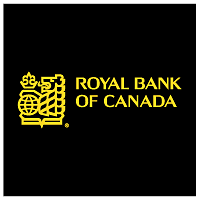
The bank's symbol is a golden lion clutching a globe, on a blue background. An older version depicted a crown above the globe and the lion faced to the left. The change coincided with an expansion in United States markets. Over the years, the lion's mane has also become less detailed and more stylized.
Corporate governance
Edson Loy Pease (1866–1930), a Quebec native, was a chief executive and managing director of the bank and one of the key people in its history. An employee of the Merchants' Bank of Halifax, he built that bank's Quebec business to where Montreal became its centre of operations. His efforts saw the Bank formally relocate its head office in 1907 to St. James Street in Montreal, following which he induced the prominent Montreal business magnate Herbert S. Holt to accept an appointment as the bank's new president. While at the time Holt's presidency was largely a ceremonial position, his name substantially raised the bank's profile and broadened its business connections.
The title of Royal Bank's top executive has changed several times. Initially it was styled as President. Later, it became chief executive officer and one often carried additional responsibilities as chairman of the board, while the second-in-command was the President. Allan R. Taylor was chairman and CEO from 1986 to 1994, and he was succeeded by John Cleghorn in that capacity from 1994-2001. Dave McKay is currently the President and chief executive officer.
- Chief Executive
- Thomas Edward Kenny (1879–1908)
- Herbert Samuel Holt (1908–1934)
- Morris W. Wilson (1934–1946)
- Sydney Dobson (1946–1949)
- James Muir (1949–1960)
- W. Earle McLaughlin (1960–1979)
- Rowland C. Frazee (1977–1980)
- Jock K. Finlayson (1980–1983)
- Allan R. Taylor (1983–1986) - Chairman and CEO (1986–1994)
- John E. Cleghorn (1986–2001) - Chairman and CEO (1994–2001)
- Gordon Nixon (2001–2013) - President and CEO (2001–2013)
- Gordon Nixon (2013–2014) - CEO (2013–2014)
- David I. McKay (2013–2014) - President (2013-2014)
- David I. McKay (2014–present) - President & CEO (2014–present)
- Chairman (non-executive)
- Guy Saint-Pierre (2001–2004)
- David P. O'Brien (2004–present)
Current members of the board of directors are: Geoff Beattie, Douglas Elix, John Ferguson, Paule Gauthier, Jacques Lamarre, Brandt Louie, Gordon Nixon, David O'Brien, Robert Peterson, Pedro Reinhard, Timothy Hearn, Kathleen P. Taylor, Victor Young, Michael McCain, Alice Labeige.
History of Head Offices
- 1864-1907: Merchants' Bank of Halifax Building, on Bedford Row, Halifax, Nova Scotia.
- 1907-1928: Four Pillars Building (demolished except for the façade[24]), at 147 Saint Jacques Street (renumbered 221 in 1928), Montreal, Quebec.
- 1928-1962: "Old Royal Bank Building, Montreal", at 360 Saint Jacques Street, Montreal, Quebec.
- 1962–present: Place Ville-Marie, at University Street & René-Lévesque Blvd, Montreal, Quebec.
- 1976–present: Royal Bank Plaza, at 200 Bay Street, Toronto, Ontario.
RBC's official legal corporate headquarters still remains at Place Ville-Marie in Montreal. However, Royal Bank Plaza in Toronto is its de facto corporate headquarters; the great majority of its management operations are based there.[25]
Awards and recognition
RBC has been awarded with many awards and recognition for its financial products and services. RBC is also one of the top 100 sustainable companies in the world. Other awards and recognitions include: In 2007, awarded the "Best Bank" in Canada by The Banker, one of the oldest banking magazines
- In 2007, RBC was recognized as the Top Most 100 powerful brands in the world
- Was recognized as the "most respected corporation" in Canada[26]
- In October 2008, RBC was named one of "Canada's Top 100 Employers" by Mediacorp Canada Inc., and was featured in Maclean's newsmagazine. Later that month, RBC was also named one of Greater Toronto's Top Employers, which was announced by the Toronto Star newspaper.[27]
According to a global Newsweek ranking, which measures how effectively companies manage environmental risks and opportunities relative to their industry peers, Royal Bank of Canada is the most environmentally friendly company in the world.[28]
Sponsorship
Like many of its competitors, RBC is a key sponsor of many events, community programs, and charities. One percent of RBC's average annual net income before taxes is set aside for charitable partnerships via the arms-length RBC Foundation.
RBC is a major sponsor of numerous cultural events, including the Toronto International Film Festival. It also sponsors the RBC Taylor Prize, a literary award for non-fiction writing in Canada, and hosts a yearly Canadian Women Entrepreneur Award.[29][30] In July 2013, the RBC Foundation partnered with the University of Toronto to revive the Siminovitch Prize in Theatre, given to recognize achievement in Canadian theatre.[31]
RBC is one of Canada's largest sponsors of amateur sports and is the longest-running Canadian sponsor of the Olympic Games. It employ dozens of top-tier amateur athletes as part-time spokespeople through the RBC Olympians program. RBC is also a major sponsor of Hockey Canada and owns the naming rights to the Canadian national junior 'A' ice hockey championship, the Royal Bank Cup. In addition, it supports Canadian hockey at the grassroots level through the RBC Play Hockey program.
RBC owns naming rights to the RBC Centre, RBC Convention Centre Winnipeg, RBC Canadian Open, and RBC Heritage (formerly the Heritage Classic). From 2002 to 2012, RBC previously held the naming rights to what is now the PNC Arena in Raleigh, North Carolina.[32]
Controversies
Merger
In 1998, the Royal Bank of Canada proposed to merge with the Bank of Montreal, at the same time as the Toronto-Dominion Bank proposed to merge with the Canadian Imperial Bank of Commerce. Both mergers were examined by the Competition Bureau of Canada, and ultimately rejected by Paul Martin, at the time the Finance Minister of Canada.
Discrimination
On January 15, 2007, CBC Radio reported RBC is "refusing" people of certain nationalities to open U.S. dollar accounts with the bank.[33] Canadian citizens with dual citizenship in Cuba, Iran, Iraq, Myanmar, North Korea or Sudan (mostly countries with U.S. sanctions) are affected. The U.S. Treasury Department restricts certain foreign nationals from using the U.S. dollar payment system to limit terrorism and money laundering after the September 11, 2001 attacks. RBC replied that compliance with such laws does not represent an endorsement by the bank and on January 17, clarified its position on the application of the U.S. laws, specifying that "with some exceptions" it does open accounts for dual citizens of the sanctioned countries.[34] There have also been reports that the bank has closed the accounts of some Iranian-Canadian citizens.[35]
Environment
Environmental groups have criticized RBC's financing of oil sands bitumen extraction and expansion, cumulatively issuing "more than $2.3 billion in loans and financing more than $6.9 billion in [corporate] debt between 2003 and 2007 for 13 companies including: EnCana, Husky Energy, OPTI Canada, Delphi Energy, Canadian Oil Sands Trust, Northwest Upgrading, Suncor, Total, Connacher Oil and Gas, InterPipeline and Enbridge." Some environmental groups believe oil sands extraction has a detrimental effect on the northern Alberta environment.[36]
2010 Ottawa branch firebombing
An RBC branch in The Glebe neighbourhood of Ottawa was firebombed in May 2010. The party responsible later identified themselves on Indymedia and threatened to make their presence at the upcoming 2010 Winter Olympics in Vancouver, as RBC was one of its key sponsors, as well as at the 2010 G-20 Toronto summit.[37]
Temporary foreign workers and Canadian layoffs
In April 2013 the CBC reported that the Royal Bank of Canada was indirectly hiring temporary foreign workers to replace 45 Canadian Information Technology workers.[38]
The CBC reported May 7, 2013, that during question period the NDP leveled accusations against the government and that Prime Minister Stephen Harper responded that the government has been working on problems with the Temporary Foreign Worker Program for more than a year.[39]
Memberships
RBC is a member of the Canadian Bankers Association (CBA) and is a registered member with the Canada Deposit Insurance Corporation (CDIC), a federal agency insuring deposits at all of Canada's chartered banks.
It is also a member of:
- CarIFS ATM Network
- Interac
- MasterCard in the Caribbean markets, and, beginning in March 2010, in Canada
- NYCE point of sale Network
- Plus Network
- Global Banking Alliance for Women[40]
See also
Gallery
 An RBC building in Richmond Hill, Ontario.
An RBC building in Richmond Hill, Ontario.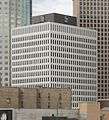

_cropped.jpg) RBC tower in Vancouver
RBC tower in Vancouver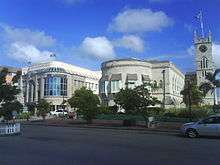 Royal Bank of Canada branch (left) and Parliament of Barbados
Royal Bank of Canada branch (left) and Parliament of Barbados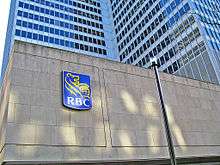 The RBC's office in Montreal at the Place Ville-Marie.
The RBC's office in Montreal at the Place Ville-Marie.
References
- ↑ McDowall 1993, Inlay
- ↑ "Royal Bank of Canada: Annual Report 2010" (PDF). RBC. 31 October 2010. Retrieved August 5, 2014.
- 1 2 Yusufali, Sasha (16 December 2013). "Royal Bank of Canada". The Canadian Encyclopedia. Retrieved August 5, 2014.
- 1 2 "Royal Bank of Canada: Annual Report 2015" (PDF). RBC. 31 October 2008. Retrieved August 5, 2014.
- ↑ "About RBC Bank: Company Profile". Rbcbankusa.com. Retrieved 2011-02-19.
- ↑ "Royal Bank of Canada: Annual Report 2008" (PDF). RBC. 31 October 2008. Retrieved August 5, 2014.
- ↑ "Canada's 100 biggest companies by market cap". The Globe and Mail. Toronto: theglobeandmail.com. 23 June 2011. Retrieved August 5, 2014.
- ↑ "The Global 2000". Forbes. 2 April 2008. Retrieved August 5, 2014.
- ↑ "Corporate Profile". RBC. Retrieved 2011-02-19.
- ↑ "Global Private Banking Benchmark 2014 | Scorpio Report". Scorpiopartnership.com. 2014-07-17. Retrieved 2015-12-27.
- 1 2 3 4 "RBC Insurance History". 2016. Retrieved 23 March 2016.
- 1 2 3 Pound, Richard W. (2005). 'Fitzhenry and Whiteside Book of Canadian Facts and Dates'. Fitzhenry and Whiteside.
- ↑ Kalman, Harold D.; Vattay, Sharon (16 December 2013). "Bank Architecture". The Canadian Encyclopedia. Toronto: Historica Foundation. Retrieved August 5, 2014.
- ↑ Nineteenth Legislature (1936). Ontario Sessional Papers (PDF). p. iii. OL 23742693M.
- ↑ Brock, Daniel J. (1990). "Jeffery, Joseph". In Halpenny, Francess G. Dictionary of Canadian Biography. XII (1891–1900) (online ed.). University of Toronto Press.
- ↑ Jordan, Meredith (3 June 2002). "RBC Centura aims high with Eagle Bancshares". Atlanta Business Chronicle. Retrieved August 5, 2014.
- 1 2 Saltzman, Aaron (20 March 2016). "Buy travel health insurance, end up with less coverage: A couple's hard lesson If you buy travel insurance, be aware of the 'first payer' clause". CBC. Retrieved 23 March 2016.
- ↑ "The Impact of Privitisation on the Banking Sector in the Caribbean" (PDF). United Nations: Econimic Commission for Latin America and the Caribbean. 30 November 2001. Retrieved August 5, 2014.
- ↑ "Implementation Completion Report on a Credit in the Amount of SDR 3.5 Million to the Co-Operative Republic of Guyana for a Financial & Private Sector Institutional Development Project" (PDF). World Bank. 15 June 2003. Retrieved August 5, 2014.
- ↑ "RBC seeks buyout of Dexia joint venture". Yahoo! Canada – Finance. 11 October 2011. Retrieved August 5, 2014.
- ↑ Robertson, Grant (3 April 2013). "RBC buying full ownership of RBC Dexia". The Globe and Mail. Retrieved August 5, 2014.
- ↑ "RBC to acquire City National Corporation, a premier U.S. private and commercial bank". Retrieved January 23, 2014.
- ↑ "RBC sells Swiss private bank operations". Retrieved July 14, 2015.
- ↑ "Fiche d'un bâtiment: Ancien siège social de la Banque Royale". Vieux-Montréal: site officiel. Ville de Montréal. Retrieved 17 November 2016.
- ↑ Sasha Yusufali. "Royal Bank of Canada". Thecanadianencyclopedia.com. Retrieved 2011-02-19.
- ↑ "RBC Financial Group - Corporate Profile - Awards & Recognition". rbc.com. Retrieved 2011-02-19.
- ↑ "Reasons for Selection, 2009 Canada's Top 100 Employers Competition".
- ↑ Global-Warming Ready, Newsweek, 8 April 2007, URL accessed 19 July 2007
- ↑ "RBC Canadian Women Entrepreneur Awards". www.theawards.ca. Retrieved 16 March 2012.
- ↑ "Charles Taylor Prize now known as RBC Taylor Prize; adds secondary award". Victoria Times Colonist. The Canadian Press. 9 December 2013. Retrieved August 5, 2014.
- ↑ "The Siminovitch Prize in Theatre announces new partnerships with University of Toronto and RBC Foundation". Yahoo! Finance. 24 July 2013. Retrieved 26 July 2013.
- ↑ "RBC buys naming rights for Winnipeg convention centre". CBC News. 2 July 2013. Retrieved August 5, 2014.
- ↑ "U.S. banking regulators carry a big stick". The Globe and Mail. 19 January 2007. Retrieved August 5, 2014.
- ↑ "RBC issues clarification on U.S. dollar accounts". Archived from the original on 2007-01-20. Retrieved 2007-01-17.
- ↑ "Discussions on closed bank accounts between Royal Bank of Canada and Iranian groups". Salam Toronto. 3 July 2013. Retrieved August 5, 2014.
- ↑ Krause, Vivian (14 October 2010). "U.S. foundations against the oil sands". Financial Post. Archived from the original on 2011-07-20. Retrieved August 5, 2014.
- ↑ Taylor, Scott; Jackson, Kenneth (19 May 2010). "Police chief vows to nab 'domestic terrorists'". Ottawa Sun. Retrieved August 5, 2014.
- ↑ Tomlinson, Kathy (6 April 2013). "RBC replaces Canadian staff with foreign workers". CBC News. Retrieved August 5, 2014.
- ↑ "Harper says foreign worker program is being fixed". CBC News. 7 May 2013. Retrieved August 5, 2014.
- ↑ "First Canadian Businesswomen's Trade Mission to Australia, Sydney, June 11-14, 2002". RBC. Retrieved August 5, 2014.
Further reading
- McDowall, Duncan (1993). Quick to the Frontier: Canada's Royal Bank. Toronto: McClelland & Stewart.
- McDowall, Duncan (1993). Au coeur de l'action: Banque Royale. Montreal: les Editions de l'Homme. in French
- Canada China Business Council
External links
| Wikimedia Commons has media related to Royal Bank of Canada. |
Official Sites
- RBC
- RBC Bank (USA)
- RBC Dominion Securities
- RBC Royal Bank of Canada
- RBC Insurance (Canada)
- RBC Royal Bank of Canada (Caribbean and Bahamas)
- RBC Wealth Management, International
Historical bank notes
- 1920 Trinidad and Tobago banknote (front) - Example of Royal Bank Caribbean banknotes
- 1920 Trinidad and Tobago banknote (back) - Example of Royal Bank Caribbean banknotes
- 1938 Saint Kitts banknote (front) - Example of Royal Bank of Canada banknotes
- 1938 Saint Kitts banknote (back) - Example of Royal Bank of Canada banknotes
- 1929's advertisement on a Chinese newspaper - The Royal Bank of Canada advertisement on a Canada Chinese Newspaper, location coverpage bottom left, dated 10 May 1929.